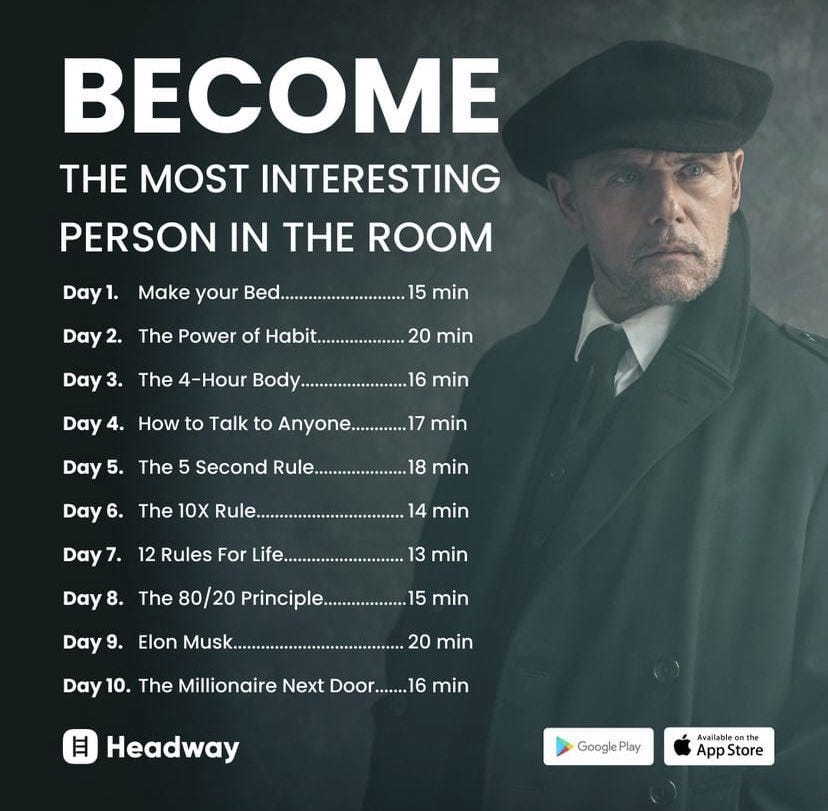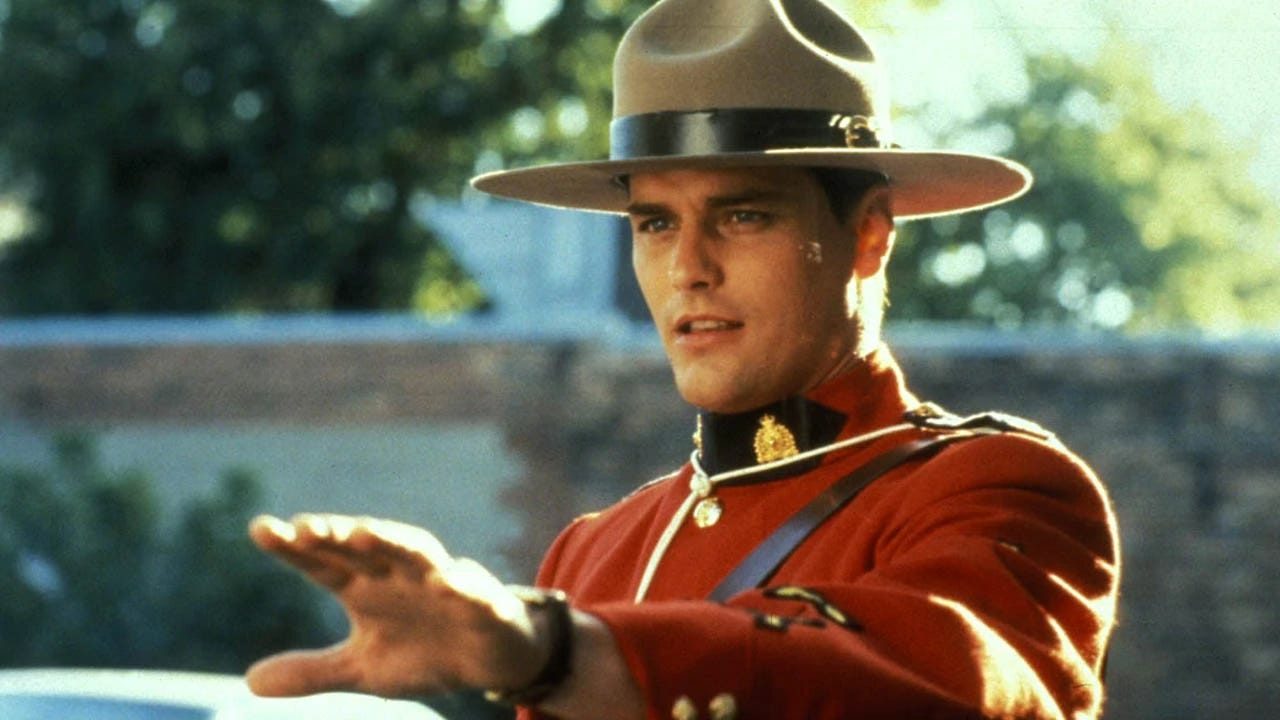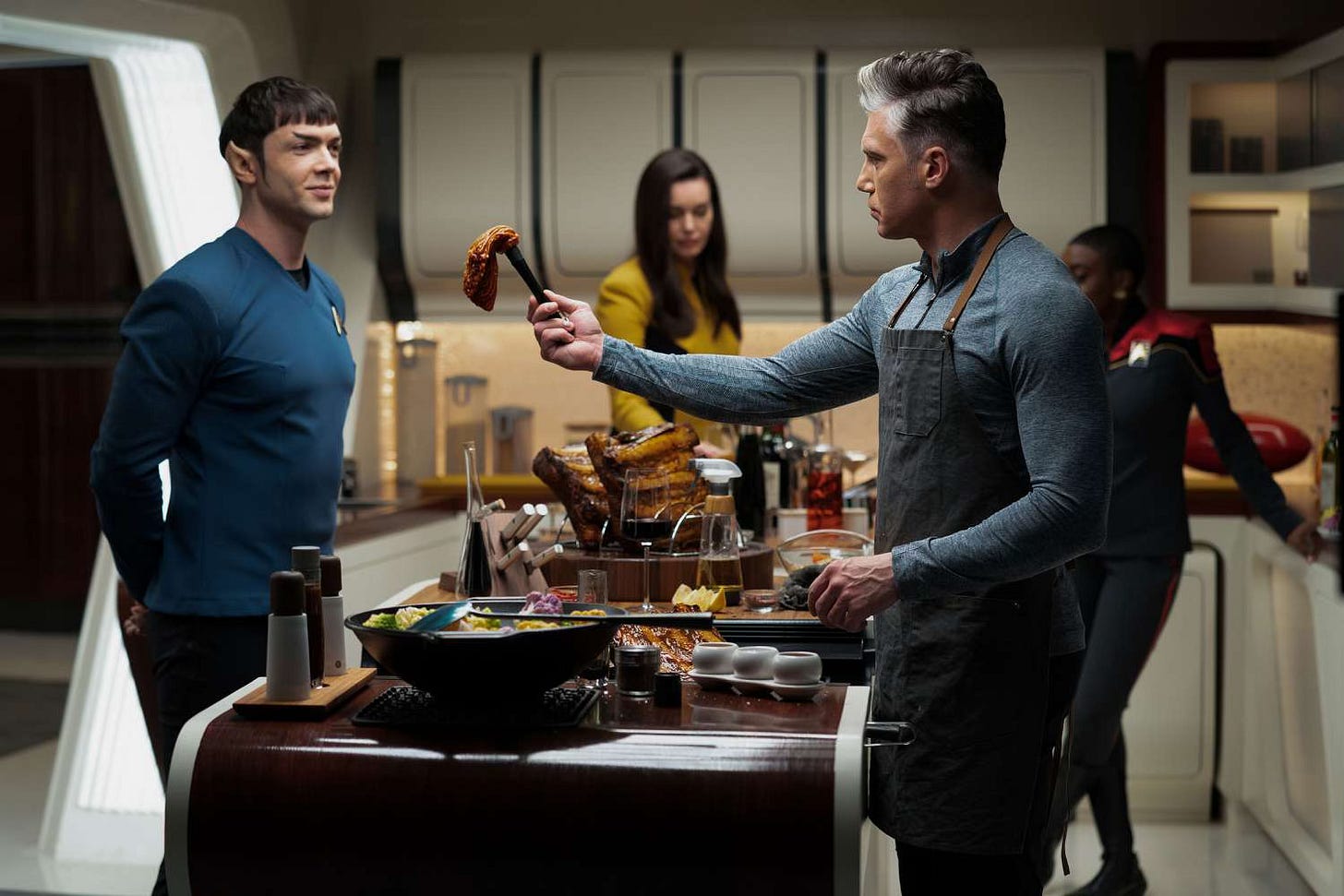Sherlock and House are to blame for the cult of Jordan Peterson and Elon Musk
How TV taught us to love the 'asshole genius'
Normal service will be resumed later this week, but first I wanted to share with you one more guest post – this time from my friend Blakeley Nixon, who I rely on to keep me in touch with popular culture, because I’m too busy reading dense books about philosophy, running marathons and volunteering to help the needy.
Anyway, it’s a great piece, as Blakeley attempts to explain just how we got to the strange cultural moment that we’re in – and what connects the dots between That Show You Used To Like and the horrors of today.
TV has changed. The so-called streaming wars, whose guiding ethos was “throw money at creators and let them do whatever they want”, has come to a close.
This means what we used to call “Peak TV” has been replaced by “Peak Meh”, and it seems that Western society is now doomed to spend the rest of time watching TV crime shows that don’t quite live up to The Wire or Breaking Bad, and politics shows that don’t quite live up to The West Wing or Veep.
And even worse, I’m now unable to steal Netflix using my brother’s password, because the streaming companies have come to the crazy conclusion that they need to start making a profit. So I’m resigned to having to pay for aggressively mediocre content.
There is still some good news, however. Though the pipeline of new stuff is spluttering to a halt, we live in an era where we can easily dive into the hits and critical darlings of yesteryear.
So despite paying for multiple premium streaming services, I’ve been mostly spending my time recently watching the 90s ratings disappointment that was Due South, via low-quality illegal uploads on YouTube.
If you can’t remember the premise, the show was about a fresh-faced Canadian Mountie who, for complicated reasons1, ends up in Chicago. He lives there with his deaf2, half-wolf dog called Diefenbaker, and is partnered with a significantly more grizzled American detective3. And each week, the duo are tasked with solving a new crime.
In many ways, Due South helped set the mould for a trope that became a staple of TV in the two decades that followed: That of the genius/savant-like figure, who is partnered with a more grounded normie4.
So this meant that in each episode we watch as Paul Gross’s Constable Benton Fraser leverages his exceptional tracking skills, honed through years of experience in the Northern Territories, and his impeccable politeness, refined through a lifetime as a Canadian, to solve murders and apprehend suspects on the gritty, crime-ridden streets of Chicago5.
Throughout the show, there are countless examples of Fraser’s near superhuman abilities. For example, he tracks a gang of Triads by tasting “low-grade gunpowder” on the nail clippings of a suspect, and figures out someone's password simply by hearing the pitch of their taps on the keyboard. He’s also often seen chasing down cars and surviving falls that would easily kill us mere mortals. And he seems to have perfect recall, and uses knowledge absorbed from his grandparents' mobile library. This once enabled him to somewhat successfully survive a plane’s crash landing by remembering a Sopwith Camel flight manual he once perused.
What’s most striking about the series from a modern perspective though is that Fraser is simultaneously a genius – and a very nice guy. He is polite to a fault, politically progressive6, and morally consistent yet non-judgemental. He’s open-minded, and he always sees the best in people.
In other words, Fraser was in good company in the 90s. Most big American shows, from Star Trek: The Next Generation and its two spin-offs, to Buffy the Vampire Slayer were premised on an ensemble of broadly likeable characters7.
And it was watching thirty or more episodes of this nice man solving crimes, mostly by tasting stuff he finds on the ground, which made me realise: Around the turn of the millennium, something profound changed in the characters we see on TV.
And I think in many ways this explains the rise of some of the worst people in our culture today.
Enter the Asshole Genius
As we entered into the first decades of this century, there was a major change in how TV was made.
Specifically, DVDs, boxsets and streaming led to the rise of serialisation – shows where the status quo wouldn’t reset at the end of the episode, where stories could be long, sprawling arcs – meant that characters could be more… complex.
This functionally meant that with the added space for creativity, writers began crafting entire TV series around a more ‘complex’ idea: The notion that to truly excel as a detective, doctor or manager, one must not only possess genius-level abilities but also have an important personality flaw: You have to be an asshole8.
In fact, in this brave new world, being an asshole is an essential part of your genius.
And if you’ve watched TV any time in the last twenty years, you know exactly what I mean. Here are some examples:
Sherlock from Steven Moffat and Mark Gatiss’s take on Conan-Doyle’s detective – who describes himself as a “High Functioning Sociopath”9. On multiple occasions, not only does the character solve the case using knowledge and “deductive reasoning”, but his abrasive personality is crucial to figuring it out.
Ari Gold, the high-powered Hollywood agent and HR nightmare in the shockingly dated Entourage TV series10. The series makes it clear that he has become one of the most powerful people in Hollywood by being an aggressive bully. He verbally abuses his gay and Asian assistant Lloyd (often referring Lloyd’s sexuality and race), he repeatedly insults women, including his wife, and, in one triumphant scene, he hunts down colleagues he wants to fire with a paintball gun11. And crucially, the series does not portray these as flaws but celebrates Gold’s actions as an effective means to success12.
Gregory House from House perhaps shouldn’t surprise us. He is, after all, a Sherlock Holmes analogue13. His abrasive personality often serves as an effective diagnostic tool14.
There are many other examples too. So this is all to say that it’s a trope that has become deeply embedded in our culture over the last 20 years.
Even Star Trek, perhaps the apotheosis of 90s Benton Fraser-esque smart friendliness gave in to the Asshole Geniuses. In Star Trek Discovery, the franchise’s 2017 streaming-era reboot the new starship captain, Michelle Yeoh’s Empress Phillipa Georgiou helps win a war by – essentially – teaching the Starfleet crew how to be assholes.
To be clear, this is not to say that the above examples aren’t good TV series15. In fact, the “Asshole Genius” trope was part of a shift towards shows focusing on more interesting, flawed, and nuanced characters, leading to some of the best TV ever made.
And there are more nuanced examples of the trope that don’t necessarily venerate the assholery, though they do still suggest that it is a necessary part of genius.
For example, Mad Men’s Don Draper is a genius advertising executive and an asshole, but his behaviour at least has negative consequences16. The same goes for Breaking Bad’s meth-making savant Walter White, who becomes more and more of an asshole to the point of losing his soul17. Rick Sanchez from Rick and Morty, seems to be an intentional pastiche of the Asshole Genius trope.
And, of course, Robert Downey Jr’s Tony Stark is perhaps the most archetypical Asshole Genius of all, but his entire character arc across nine Marvel films is about him learning to not be such an asshole.
But what’s strange and perhaps even more disturbing is that despite these more complex portrayals, where actions are shown to have consequences, it has not stopped people in the real world from emulating Draper’s fashion sense, venerating Walter White in song, aggressively emulating Sanchez’s obsession with Szechuan Sauce, or elevating Tony Stark as an aspirational figure.
It seems I am part of a generation whose formative years of TV and movie-watching taught us the lesson that for one to be exceptional one must also be an asshole.
The Real World Asshole Geniuses
This brings me to the real world.
We live in a frightening reality, where one of the most important people in the world, culturally, economically and politically, is Elon Musk – perhaps the ultimate Asshole Genius.
Today, Musk owns a major social media company that at his whim could conceivably determine the outcome of the most important US election of our lifetime. He has transformed Twitter from a platform with a mild extremism problem to one that now actively promotes the worst views of any passing Nazi with $8 a month to spend on a blue tick. And he has personally promoted a tweet about the antisemitic ‘Great Replacement Theory’ (though he has more recently questioned the theory18). In short, his activities on social media are coming very close to undoing the genuinely positive things he has done in the fields of electric cars and rocketry19.

Yet despite this, he still commands a cult following, thanks to a clique of fans who think that he is a real-life Tony Stark. He might be an asshole, the thinking goes, but an Asshole Genius is what we need to save the world.
And Musk is far from the only Asshole Genius who plays an outsized role in our culture today.
For example, there’s teary-eyed, alt-right Oprah, Jordan Peterson, one of Musk’s fellow anti-woke crusaders who has built a similar cult around his own supposed genius. Peterson believes fighting for the future of humanity requires him to call women he disagrees with “harlots” and to wax lyrical about “The Problem with Too Much Empathy”.
Then there’s Andrew Tate, the confusingly accented, definitely not gay, social media personality/bodybuilder/professional misogynist, who seems very unimpressed by his own 140+ IQ.
There are other influential figures like this too, who all fit into this “Asshole Genius” mould. And that’s why whenever I come across videos from the likes of Musk, Peterson, and Tate, I experience a feeling of déjà vu. Because their public personas, or perhaps the personas they and their fans wish to present, mirror the traits of fictional Asshole Geniuses.
To their fans, they are unquestionably brilliant, and their intellect not only justifies their unpleasant behaviour but even makes it admirable. To the rest of us, it’s perhaps obvious that while they may definitely be assholes, it’s less clear whether they are geniuses.
And what is notable that the core audience for these individuals often overlap with the demographic of young men who were raised on the Peak TV Asshole Geniuses of the 2000s and 2010s.
So this leaves me wondering, could there be a connection between the two? Could the Asshole Geniuses on TV over the last two decades have inadvertently incubated a culture that celebrates the real life Asshole Geniuses of today?
Being nice is cool again
I am not directly blaming the writers of Sherlock, House, Entourage and the rest for the phenomena of Elon Musk, Jordan Peterson and Andrew Tate—at least, I don’t think I am.
However, I don’t think it’s a coincidence that they emerged from a culture where the Asshole Genius is one of the most celebrated figures in fiction. We shouldn’t be surprised that the same generation that grew up being told “being an asshole is good” today venerates some of the very worst people on the planet.
In any case, there is some cause for optimism. In more recent times, there is evidence of a cultural pushback against the Asshole Genius trope.
For example, Ted Lasso is premised on the idea that you can save an entire English Premiership football team by being super-powered-level nice. And on the opposite end of the spectrum, while literally, every character in Succession is a deeply terrible person, the series at least makes it very clear that these people are not geniuses and are not to be admired20.
My favourite recent departure from the Asshole Genius trope though is found in another modern Star Trek spin-off. Strange New Worlds, which premiered in 2022 returns to the franchise's roots, and emphasises friendly teamwork, empathy, and ethical decision-making21. The show’s starship captain, Christopher Pike, is very much a genius in his own right, but he shows viewers that leadership can come from compassion and that it involves regularly cooking a nice meal for your subordinates.
These examples suggest that perhaps we are finally moving away from the lesson taught over the last two decades – that being an asshole is necessary to be good at your fictional job. And perhaps if we’re lucky, these nicer values will seep into the wider world too, and this newer generation of kinder characters will help us find and celebrate kindness, empathy and integrity – just like Due South’s Benton Fraser did back in the 90s.
Phew! You reached the end! Don’t forget to follow Blakeley on Twitter (and tell him to write more often), and to subscribe (for free) to my Substack for the hottest politics, policy, tech and media takes. Sometimes I even try cultural criticism myself.
As Fraser explains multiple times “I first came to Chicago on the trail of the killers of my father, and for reasons that don't need exploring at this juncture I've remained, attached as liaison with the Canadian Consulate”.
I spent much of my time watching the series getting annoyed at the many examples of Diefenbaker definitely not being deaf.
Actually “detectives” plural. The main American lead was replaced in a convoluted way typical of 90s TV.
The Mentalist, Blacklist, Person of Interest, Monk, Numb3rs, the Limitless TV series…
Well, Toronto, where it was actually filmed.
At least as progressive as one can be in the 90s tv show with no people of colour, LGBT people, or, I am sure, any episode that passed the Bechdel Test.
I am expecting some Ben Sisko comments.
James insisted I use the American spelling, instead of the correct and proper “Arsehole”, because “asshole could be more viral”. What an arsehole move.
He is not a “High-Functioning Sociopath” – it seems the writers just liked the phrase.
Interestingly, Ari Gold is modelled on real world agent Ari Emanuel, brother of Rahm Emanuel the real life inspiration for Josh Lyman in The West Wing.
For 28 year old me, this was the greatest moment in TV history.
What's truly astonishing about the fictional character Ari is that every reprehensible thing he does seems eerily plausible in real-life Hollywood, and his real world equivalents would likely face similarly minimal repercussions.
In the books, Sherlock Holmes can occasionally be rude, dismissive and doesn’t suffer fools easily, but he’s also friendly and courteous in everyday life. So many adaptations seem to have taken the few occasions he was a bit of a dick to Lestrade as a basis for his whole character.
Just watch any of the many House compilations on YouTube to see the many examples of this.
One day, I will have to dig deeply into my soul and ask why I enjoyed Entourage so much when it was first on. I may not like the answer.
Spoiler alert: he's divorced twice, his daughter disowns him, his ad agency collapses and he eventually loses the job that defined him. Actor Jon Hamm also suggested that his drinking and smoking catches up with him and, though not part of the series, he dies in 1974.
James has asked me to cite an example of this and all I can do is gesture wildly to five excellent seasons of Breaking Bad.
It’s good to know that one of the most powerful men in the world is unconvinced that Jews are trying to replace us.
I patiently await James’s follow-up to this article.
Though much like Rick and Morty, I fear that some people might not quite get the learn the right lessons from Succession.
That’s not to say that the show doesn’t cover the darker side of it’s crew.









Good read, I enjoyed that and many of your points resonate. These people are not geniuses and seem to be seeking a shortcut to seeming to be, which others recognise. Perhaps an entire field of research in there!
Were there really no a**holes (or a**eholes) in the 90s?
(PS. There needs to be a self-help group for British people in 2024 still watching American dramedies from the 90s/00s. I don't know if it's a good or bad thing, but I am still a huge fan of Ed. Remember Ed? He was the bowling-alley lawyer).